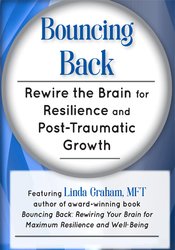Description
Clients seek our help in coping with the difficulties, even disasters, in their lives. Sometimes clients’ coping strategies are defensive, maladaptive, seemingly “stuck” and intractable, blocking their learning and derailing their resilience.
New research in post-traumatic growth is teaching us how to help clients fully recover from the traumas and tragedies that turn their lives upside down and shatter their faith in life being worth living.
Join bestselling author and international trainer, Linda Graham, as she teaches you the modern neuroscience and behavioral science techniques that help clients rewire dysfunctional patterns. She will show you how to create new more adaptive coping strategies in ways that are safe, efficient, and effective. You can help clients successfully create the shifts that change their brains, thus change their behaviors, thus change their lives.
In this experiential workshop, you’ll learn techniques to help clients:
- Manage stress and recover from trauma
- Heal toxic shame and retire the inner critic
- Antidote the brain’s negativity bias and regain equilibrium from which healing and growth can occur
- Strengthen social-emotional engagement, prime the brain for learning and growth
- Strengthen executive functioning and foster resilience
- Recover from anxiety, depression, grief, loneliness, guilt
- Discover new meaning, community, fulfillment
- Come to more clarity and discernment in decision making
- Recover a sense of competency and courage to take growth-enhancing risks in life
You will help clients strengthen the functioning of the brain to not only get through hard times but to thrive in their midst!
CPD
CPD
- PESI Australia, in collaboration with PESI in the USA, offers quality online continuing professional development events from the leaders in the field at a standard recognized by professional associations including psychology, social work, occupational therapy, alcohol and drug professionals, counselling and psychotherapy. On completion of the training, a Professional Development Certificate is issued after the individual has answered and submitted a quiz and course evaluation. This online program is worth 6.0 hours CPD for points calculation by your association.
Faculty
Linda Graham, MFT, is an experienced psychotherapist in the San Francisco Bay Area, bestselling author and international speaker. She integrates modern neuroscience, mindfulness practices, and relational psychology in her worldwide trainings. She is the author of Bouncing Back: Rewiring Your Brain for Maximum Resilience and Well-Being, winner of the 2013 Books for a Better Life award and the 2014 Better Books for a Better World award. She publishes a monthly e-newsletter, Healing and Awakening into Aliveness and Wholeness and weekly Resources for Recovering Resilience. For more information visit www.lindagraham-mft.net
Linda draws on her own experiences of healing and awakening as well as more than two decades of integrative study, practice and teaching of transformational psychotherapies, vipassana meditation, life coaching, and facilitating groups and workshops to become a skillful guide interweaving many paths of compassionate, conscious connection. She is passionate about integrating the paradigms and practices of modern neuroscience, Western relational psychology and Eastern contemplative practice.
Speaker Disclosures:
Financial: Linda Graham maintains a private practice. She receives a speaking honorarium and recording and book royalties from PESI, Inc. She presents professionally and receives compensation, and she receives royalties as a published author. She has no relevant financial relationships with ineligible organizations.
Non-financial: Linda Graham has no relevant non-financial relationships.
Objectives
- Assess your client’s levels of stress and trauma effectively to implement appropriate somatic tools to improve treatment outcomes.
- Determine how the differences among secure, ambivalent, anxious and disorganized attachment categories can better inform clinical assessment of trauma.
- Teach clients tools of self-directed neuroplasticity to reverse the impact of stress and trauma on brain functioning and their capacities to cope.
- Integrate skills to help clients cultivate positive emotions to shift brain functioning from contracted survival responses to larger perspectives and openness to change.
- Utilize practices of mindfulness and self-compassion with clients to help recover the capacities of the prefrontal cortex for response flexibility and resilience.
- Incorporate specific memory reconsolidation techniques to help clients change how they perceive and respond to memories of past traumatic events.
Outline
Essentials of Brain and Behavior Shift
- Evolution and development of human brain
- Impact of relationships on brain development and coping strategies
- Four mechanisms of brain change
- Four practices that accelerate brain change
Recover Equilibrium When Experiencing Stress and Trauma
- Body-based tools to regulate the stressed-out/numbed-out cycles of the nervous system
- Body-based tools reduce symptoms of PTSD
- Social engagement tools to antidote the brain’s innate negativity bias
- Sensorimotor approaches to manage surges of emotions
- Practices to prime the brain’s plasticity-receptivity to learning
Manage Emotions Skillfully
- Shift out of the brain’s ruminative negative judgments
- Rewire memories of toxic shame
- Manage anxiety when facing the new or the unknown
- Experience new self-acceptance and self-appreciation
- Strengthen one’s sense of self and self-worth
- Recover internal working models of resilience
Reflection-Re-Appraisal of Events
- Re-frame meaning and consequences of challenges and catastrophes
- Finding silver lining in difficulties and disasters
- Contextualizing traumatizing events in coherent narrative
- Re-engagement with larger world; accessing resources; recovering self-efficacy
- Finding renewed meaning, purpose, authentic and resilient self
Target Audience
Addiction Counselors, Case Managers, Counselors, Marriage & Family Therapists, Nurses, Psychologists, Social Workers, and other Mental Health Professionals.


